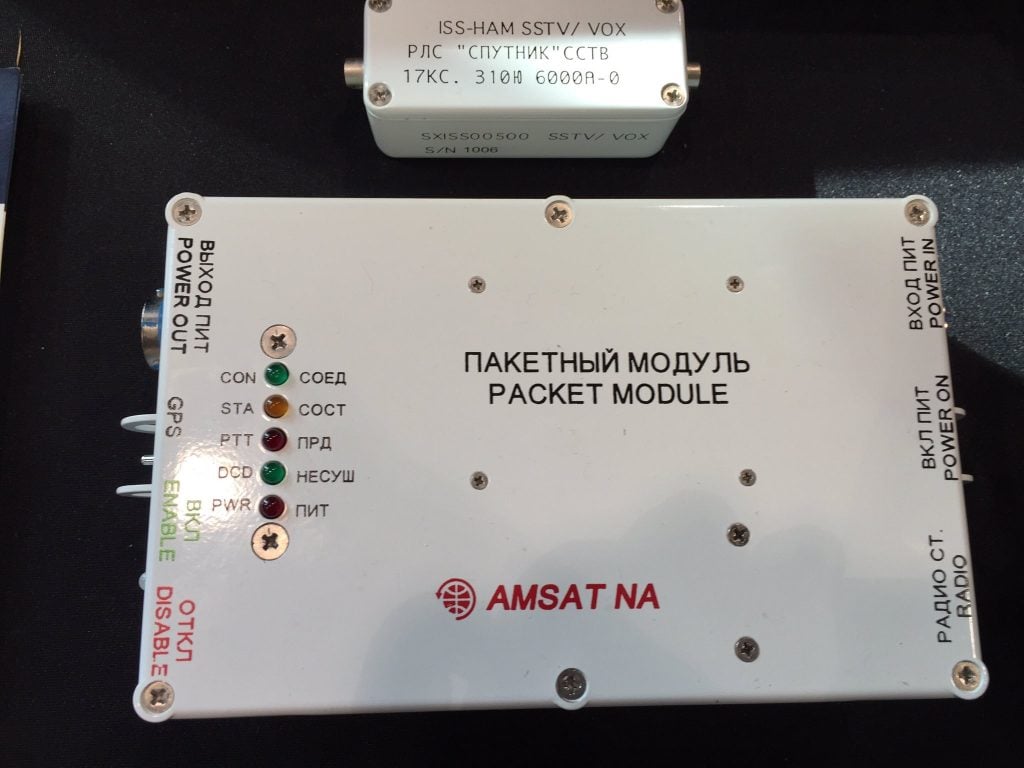ARISS NEWS RELEASE
no. 17-10
July 25, 2017
David Jordan, AA4KN
ARISS PR
[email protected]
Packet Module status on board ISS
ARISS has received several reports stating that the packet system on ISS is down. Here is what we know and our current forward plan.
The packet system in the Columbus module started to act up late last week, sending only a beacon. The ARISS team requested a power recycle by the crew, and with that power recycle, the packet system appears to have stop functioning completely. Note that this unit has been on-orbit for 17 years. It was launched on the STS-106 Space Shuttle Atlantis mission in September 2000 and was built, tested and certified for flight about 20 years ago.

The ARISS team has had some extensive discussions on the way forward. We would first like to do some additional troubleshooting with the existing packet module. It will take some time (weeks) to develop troubleshooting procedures, get the procedures approved by NASA and then conduct the tests with the crew. This includes an additional power cycle. The turnaround time is much longer than usual because a new crew will soon be arriving on ISS. The current crew is focused on the new crew arrival and there will be about a one- to two-week transition after the new crew arrives. On the positive side, one aspect of our troubleshooting-a second power cycle-will occur automatically because ARISS is shut down during crew docking and turned on afterwards. However, there will be more to our troubleshooting than just the power cycle.
We have some additional plans with alternative solutions, but those are currently being discussed and prioritized within the ARISS team. All solutions will require international ARISS team coordination, additional procedures and crew interaction. People who have carefully followed ISS operations know that crew time continues to evolve with the more extensive research that is occurring on-board. Suffice it to say, it will take longer than what it has taken in the past to work through this issue.
The above information is to make sure that ARISS properly sets expectations on how long it will take to resolve this. At this point, expect a few months with no ARISS packet.
As you all can see, deploying the Interoperable Radio system that is currently under development by ARISS has become even more critically important. The ARISS team is laser focused on getting that system developed and deployed. We are conducting a final design review with NASA on this system next week. But we cannot get to the finish line without your help. If you can, please consider a donation to the ARISS radio fund by clicking on the ARISS donate button on the ARISS web page (www.ariss.org) or the AMSAT web page (www.amsat.org). All donations, large and small are appreciated.
On behalf of ARISS, we thank you for your sustained interest and support of our program.
Sincerely,
Frank H. Bauer, KA3HDO
ARISS International Chair
About ARISS
Amateur Radio on the International Space Station (ARISS) is a cooperative venture of international amateur radio societies and the space agencies that support the International Space Station (ISS). In the United States, sponsors are the Radio Amateur Satellite Corporation (AMSAT), the American Radio Relay League (ARRL), the Center for the Advancement of Science in Space (CASIS) and the National Aeronautics and Space Administration (NASA). The primary goal of ARISS is to promote exploration of science, technology, engineering, and mathematics (STEM) topics by organizing scheduled contacts via amateur radio between crew members aboard the ISS and students in classrooms or informal education venues. With the help of experienced amateur radio volunteers, ISS crews speak directly with large audiences in a variety of public forums. Before and during these radio contacts, students, teachers, parents, and communities learn about space, space technologies and amateur radio. For more information, see www.ariss.org, www.amsat.org, and www.arrl.org.
Join us on Facebook: Amateur Radio on the ISS (ARISS)
Follow us on Twitter: ARISS_status
